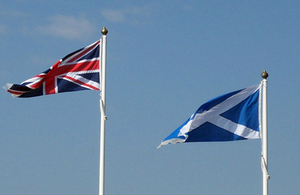Scottish independence referendum – what's next?
The Scottish independence referendum took place on 18 September 2014. On this page, you’ll find useful information about what happens next.

United Kingdom and Scottish flags
What’s happened?
On 18 September 2014 the Scottish independence referendum took place and Scotland voted to stay part of the United Kingdom. Voters in Scotland were asked to answer Yes or No to the question “Should Scotland be an independent country?” 55.3% voted No and 44.7% voted Yes. 84.6% of the electorate participated in this historic vote to decide Scotland’s future.
What happens now?
Scotland will remain as part of the United Kingdom, with its own Parliament. The UK and Scottish governments will continue to make the changes to the powers of the Scottish Parliament that were agreed in the Scotland Act 2012.
On 19 September, Prime Minister David Cameron announced that Lord Smith of Kelvin has agreed to oversee the process to take forward the devolution commitments on further powers for the Scottish Parliament by the three pro-union parties.
Read the Prime Minister’s statement.
What are the next powers to be devolved?
As laid out in the Scotland Act 2012, further devolution of financial powers to the Scottish Parliament will come into effect from April 2015 and April 2016. The next powers to be devolved are:
1. Stamp duty land tax and landfill tax
From April 2015, Scottish government legislation will replace stamp duty land tax and landfill tax in Scotland with the Land and Buildings Transaction Tax and Scottish Landfill Tax Revenue. Scotland will become responsible for the collection of the new taxes.
2. Extending borrowing powers
From April 2015, current borrowing powers of up to £500 million will be extended and a new Scottish cash reserve will be created to help manage the new tax receipts.
3. New capital borrowing power
From April 2015, there will be a new £2.2 billion capital borrowing power for the Scottish Parliament, with a limited version of the power in place from April 2013 to allow the Scottish government to fund £100 million of pre-payments for the Forth Road Crossing.
4. Scottish rate of income tax
A new Scottish rate of income tax will come into force in April 2016. This means the Scottish Parliament will set a new Scottish rate – with no upper or lower limit - which will apply equally to all of the reduced main UK income tax rates.
Overview of devolved and reserved powers

Graphic showing the main devolved and reserved powers
How does the result affect me?
Scotland will continue to be part of the United Kingdom family of nations. More of the decisions that matter to Scots will be taken in Scotland, backed up by the strength, stability and security of the United Kingdom.
How can I find out more?
Visit www.GOV.UK/scottishreferendum for latest updates on the referendum news and devolution developments.
Find out more about the Scottish devolution settlement
Read more about Scotland’s place within the UK in Scotland in the UK.